Search
Summary 
Loading AI-generated summary based on World History Encyclopedia articles ...
Search Results
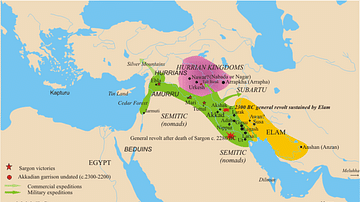
Definition
Akkad and the Akkadian Empire
Akkad was the seat of the Akkadian Empire (2334-2218 BCE), the first multi-national political entity in the world, founded by Sargon the Great (r. 2334-2279 BCE) who unified Mesopotamia under his rule and set the model for later Mesopotamian...
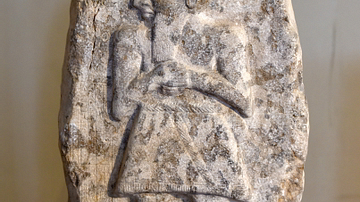
Image
Akkadian Stele of Ilšu-rabi from Tell Abu Sheeja
The stele was found at Tell Abu Sheeja, north of modern-day Amarah city, Maysan Governorate, Iraq. The Old Akkadian cuneiform inscription on the left side of the viewer mentions the name of the city of Pašime. Pašime lies western to the ancient...
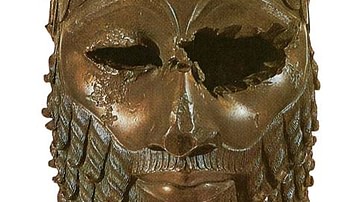
Image
Akkadian Ruler
Bronze head of an Akkadian ruler, probably Sargon the Great, c. 23rd - 22nd century BCE.
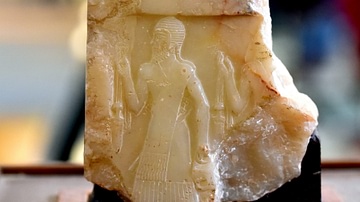
Image
Akkadian Soldier on Naram-Sin Victory Stele from Wasit
This alabaster stele (with different registers) was fragmented when originally found and only three fragments have survived; two are in the Iraq Museum in Baghdad and one is in the Museum of Fine Arts, Boston, USA. The stele commemorates...
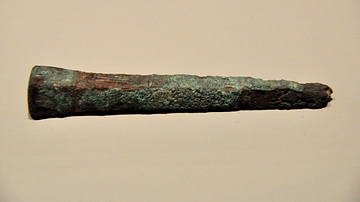
Image
Akkadian Bronze Peg with Inscriptions
This is the oldest inscribed object among the Sulaimaniya Museum's collections. The cuneiform inscriptions can be seen on the upper surface of the peg. 3rd millennium BCE, Mesopotamia, Iraq. (The Sulaimaniya Museum, Iraq).
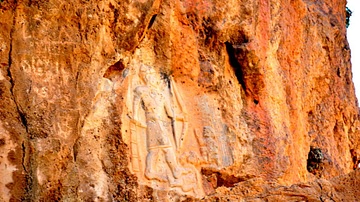
Image
Mt. Darbandi Bilula's Akkadian Rock Relief, Mesopotamia, Iraq
This rock relief dates back to the Akkadian era. It lies on the cliff of Mt. Darbadi Bilula, Hori and Shekhan area, Sulaimaniya, near the Iranian border, Iraq. Circa 2100 BCE. It features a victorious man with two captives before him; one...
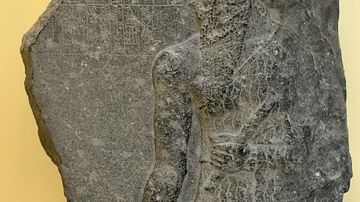
Image
Stele of the Akkadian king Naram-Sin
According to the inscription on the diorite piece of stele, it belongs to King Naram-Sin. It was found in Pir Hüseyin, a village near Diyarbakır. As it shows the borders of the Akkadian State in the era of Naram-Sin and reflects the artistic...
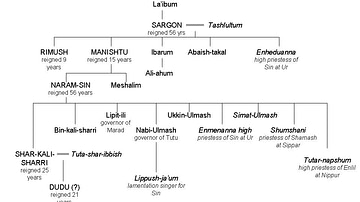
Image
The Akkadian Dynasty
A family tree of the Akkadian Dynasty, starting with La'ibum and Sargon of Akkad.
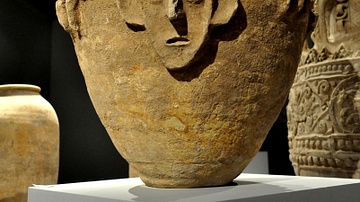
Image
Pottery Basin from Akkadian period
This large pottery basin was decorated with a human face and dates back to the Akkadian period, 2350-2156 BCE, Mesopotamia, Iraq. (The Sulaimaniya Museum, Iraq).
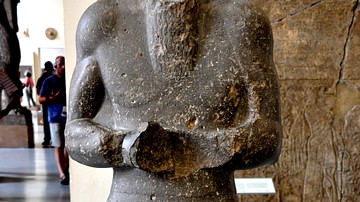
Image
Diorite statue of an Akkadian ruler of Ashur
This statue was unearthed during the German excavations at the city of Ashur in 1905 CE. The statue depicts a man in a long gown, which is girded at the waist with a belt. The details of the body, especially at the shoulders and upper arms...